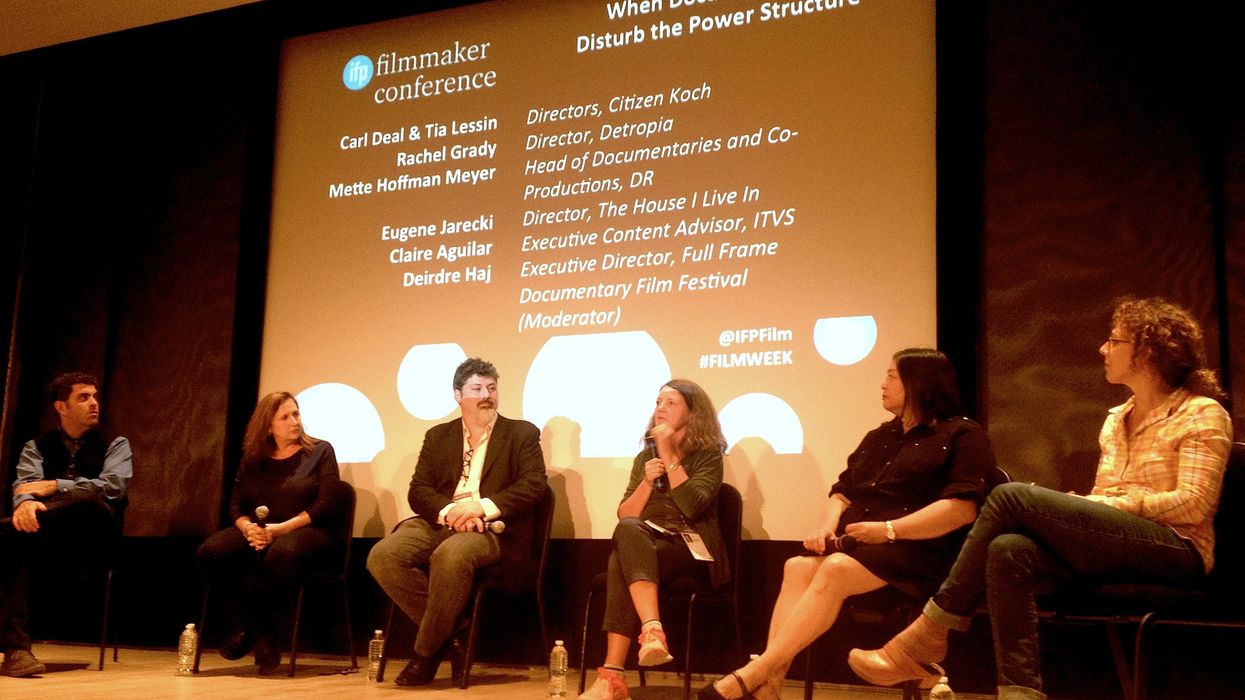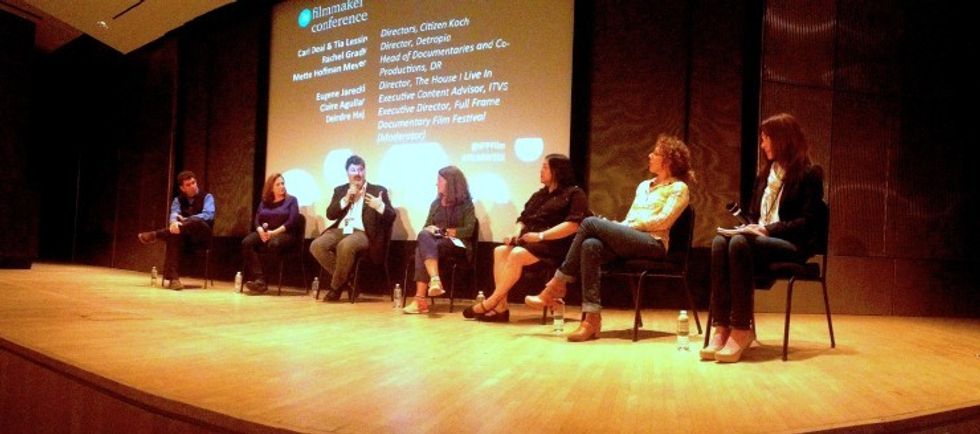Public Broadcasting Censorship Sparks Fiery Exchange at IFP Film Week

Directors threw caution to the wind Monday at the IFP 2013 Film Week, engaging in a heated on-stage debate during the "When Documentaries Disturb the Power Structure" panel. The heat was no surprise, given the recent controversy over ITVS' decision to withdraw support and public television broadcast for Citizen Koch, after David Koch -- who is not shown in a flattering light in the film -- withdrew a large anticipated donation from PBS flagship station WNET (read the full story reported by Jane Mayer in The New Yorker).
The real surprise was that the most heated debate wasn't between the Co-Directors of Citizen Koch and the ITVS Executive Content Advisor on the panel, who voiced her support for their film and their cause. Tensions rose surrounding the question of how best to address the corruption evident in US public broadcasting -- whether to blame "podunk public broadcasting executives," as one panelist put it, or the systemic problems which force them to cater to private funders in the first place.
IFP requested that the Film Week panels not be independently filmed, so I will do my best to reconstruct the highlights below.
The fun began when Rachel Grady, Co-Director of Detropia, mentioned that filmmakers need to engage their audiences around the issues their films tackle for years after the release. "That part you don't get paid for," she said, to which Citizen Koch Co-Director Carl Deal jokingly countered, "What part do you get paid for?"
Deal and his Co-Director Tia Lessin have found this question more complicated than usual since ITVS reneged on their deal. More important than the $150,000 payment (which the filmmakers were able to raise back via Kickstarter) was the potential for public broadcast via Independent Lens, which would have doubtlessly brought more diverse viewers to the piece than the self-elected theatrical ticket-buyers or DVD purchasers who now make up the likely audience. Instead of showing on public airwaves, Citizen Koch now risks preaching only to the choir.
Mette Hoffman Meyer of the Danish Broadcasting Corporation provided much-needed global context to the debate, remarking that American filmmakers are fooling themselves by championing social media websites as the new funding apparatus, replacing tax dollars. "Isn't it a systemic error to rely on the good feeling of an investor on a particular day to fund your films?" Meyer is the Executive Producer of Why Poverty?, an international co-production of eight documentaries shown by over 70 broadcasters to hundreds of millions of international viewers, but barely seen in the US.
In Denmark, Meyer said, 77% of people saw the program and 57% of those who knew of Why Poverty? deemed poverty and inequality as more important issues after the campaign. She emphasized that large Arab audiences showed the broadcasts and organized surrounding discussions, but that the US broadcast of Park Avenue was stripped of all branding associated with Why Poverty?, marketed as "controversial" despite painstaking fact-checking, and followed by a roundtable which the Director, Alex Gibney, was not invited to attend.
While conversations between documentarians about the power of documentaries to ignite social change might have the tendency to lean towards the self-congratulatory rhetoric of "speaking truth to power," Eugene Jarecki, Director of The House I Live In, made sure this was not the case yesterday. "You cannot gently whisper truth to power," he said in a spirited soliloquy that resulted in an outburst of applause from the audience.
Referencing Orwell, Jarecki said, "Universal deceit is the norm, and well-funded. I know of no revolution that came from the powerful. Thanks to the media, we spend more time talking about Assange's sex life than any of the substance of his wires. You can only speak truth to the powerless." He emphasized the futility of vilifying "podunk PBS executives" who curate public media while catering to private funders, saying they amount to a red herring distracting from the real systemic issues embedded within our "many-headed hydra" of global capitalism.
At this point, a woman walked to the Q&A mic and said, "I am a podunk PBS executive." In an effort to "clean up the facts," she said that Park Avenue received four times the average national audience on Independent Lens, and that she had never seen a submission of Citizen Koch to her division of PBS. This is not difficult to understand as the film's public broadcast was likely nipped in the bud before it reached her desk. Still, the comment drew accusations of slanting the story, and indeed it might add another layer of doubt to a narrative already fraught with rumor and controversy.

The ensuing uproar calmed when a self-identified co-founder of Newsreel and IFP approached the Q&A mic and summarized the seed of discontent and in-fighting within the room. "I don't think Koch is possible to deal with because he is such a sneaky right-wing bastard." He then balanced his comments with, "You have a bad attitude, Eugene. And I like it very much."
IFP's video of the event will released in the coming weeks.
Despite the relatively healthy media coverage of the Citizen Koch controversy, it is the only film represented on the IFP panel that has not been broadcast on PBS. Did the print coverage of the controversy make up for the lost broadcast audience? How will this precedent effect the future of free speech in American public media? It can only be assumed that in reaction to this scandal, the David Koch's of the future will simply perfect the privacy of their censorship activities. If so, will institutions like ITVS have the backbone -- or financial independence -- to stand up to pressures presented by private interests?











